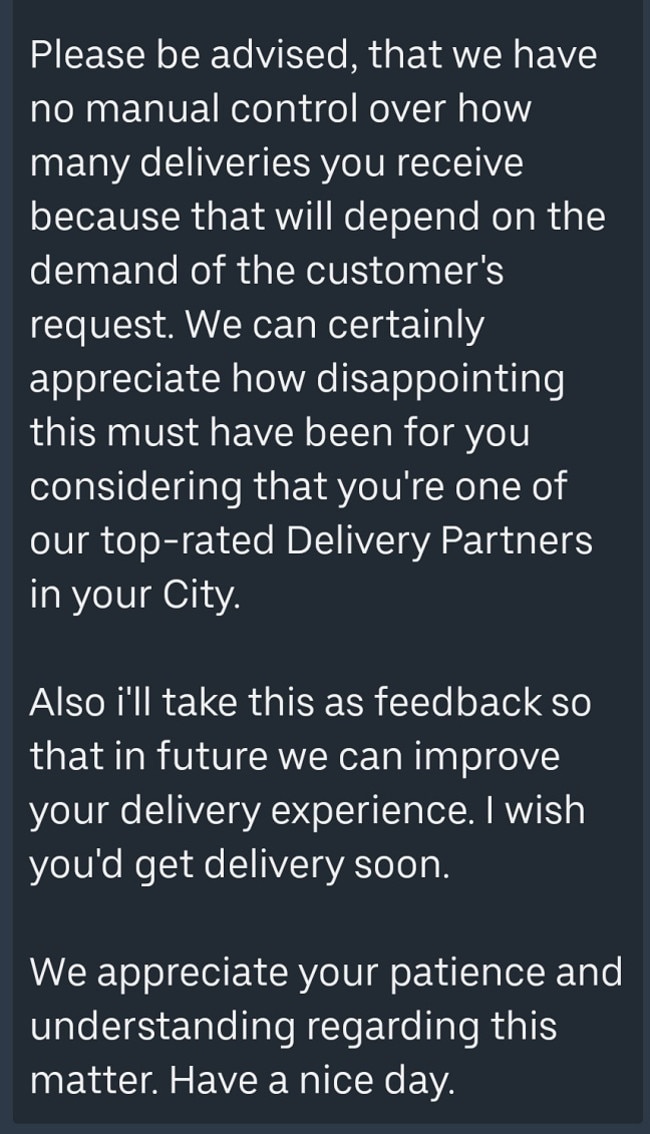‘40 per cent drop overnight’: UberEats bicycle riders say algorithm change preferences motorbikes and cars
UberEats bicycle riders have been left in the dark about an algorithm change they say has wiped out their income by nearly 50 per cent overnight.
UberEats bicycle riders have been left in the dark about an algorithm change they say has wiped out their income by nearly 50 per cent.
With demand for meal delivery services booming during the coronavirus lockdowns, Alok Bhatia was one of thousands of international students – ineligible for government support – able to earn an income on platforms like UberEats.
Prior to June, the University of Adelaide law student was averaging 30 to 40 trips a day, mainly from the West Terrace McDonald’s in the city centre, earning between $210 and $250 per shift.
In the last week of May, “suddenly there was a switch in the system”, according to 34-year-old, with nearly all orders being shifted to motorbike and car drivers – in some cases for trips as short as 900 metres, which typically would be given to bicycle riders.
“I would be trying to pick up orders outside McDonald’s, orders would be pouring in and I was not getting a single one,” he said.
“There were almost 20 pings in the system – just a day before, the system would pick up the ping closest, that’s how the algorithm worked.”
It’s also not great for customers, he argues, who have to pay a minimum base fare of $6.60 for a car delivery versus $5.50 for the same trip on a bicycle.
Mr Bhatia says he now averages around 15 to 17 trips per shift, earning a little under $140.
“I’ve been doing 12 hours a day on a bicycle delivering food since this (coronavirus crisis began), now my income has completely plummeted almost 50 per cent,” he said.

UberEats has not provided any explanation, with offshore support staff offering “random and vague”, standardised answers through the chat system.
“I have reviewed your profile and it looks like you are doing everything right on your end,” a support officer said in one message.
“I have also checked for any technical outages, but the app seems to be working as it should. As a friendly reminder, I highly advice (sic) for you to do troubleshooting the app.”
In another exchange, an UberEats staff member said the number of delivery requests Mr Bhatia was receiving “may not be as many as you previously experienced, however, I can confirm to you that there is nothing wrong with your account and that we have not made any changes”.
“Please be advised that we have no manual control over how many deliveries you receive because that will depend on the demand of the customer’s request,” another message said.
“We can certainly appreciate how disappointing this must have been for you considering that you’re one of our top-rated Delivery Partners in your city. Also I’ll take this as feedback so that in future we can improve your delivery experience. I wish you’d get delivery soon.”
Mr Bhatia has formed a WhatsApp group with UberEats bicycle partners from other parts of the country in the same situation.
UberEats did not respond to multiple requests for comment.

The Transport Workers’ Union (TWU) confirmed it had received similar reports, and said it believed the issue was related to a possible oversupply of delivery drivers due to the COVID-19 crisis putting many visa holders out of work.
“That’s led to all sorts of unfairnesses creeping in,” said TWU Assistant National Secretary Nick McIntosh.
“This example is that car riders are being preferenced over bikes, but there can be any sort of unfairness that’s happening purely due to oversupply.”
Mr McIntosh said the “fundamental problem” was that companies like UberEats and Deliveroo “can pretty much do whatever the hell they want because there’s no regulation in this space”.
“The problem with the law in this country is basically either you’re an employee and you get everything – minimum wage, sick leave, annual leave, super – or you’re not and you get nothing,” he said.
The union has led a number of legal challenges against the main food delivery platforms, and in 2018 won a landmark case against Foodora, which has since exited the market.
The full bench of the Fair Work Commission recently found in favour of UberEats in the case of another Adelaide driver, despite strongly criticising the company’s contractual system.
The TWU is appealing that decision in the Federal Court, with a view to re-examining a 1984 High Court test used to determine whether someone is classified as an employee.
“The only way we can get any rights for an individual is to take each individual case to court, which is time-consuming and doesn’t provide any certainty because what tends to happen with these companies is they move the line (to) structure the work differently,” Mr Mr McIntosh said.
“The government needs to actually step in and properly regulate this area of work.”
In 2018, a Senate inquiry recommended a broadening of the definition of employee to include gig economy workers.
In NSW, the business model of companies like UberEats and Deliveroo are expected to come under scrutiny as a parliamentary inquiry into the future of work gets underway.
A similar inquiry in Victoria, led by former Fair Work Ombudsman Natalie James, is due to issue a report soon.




